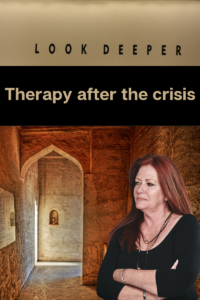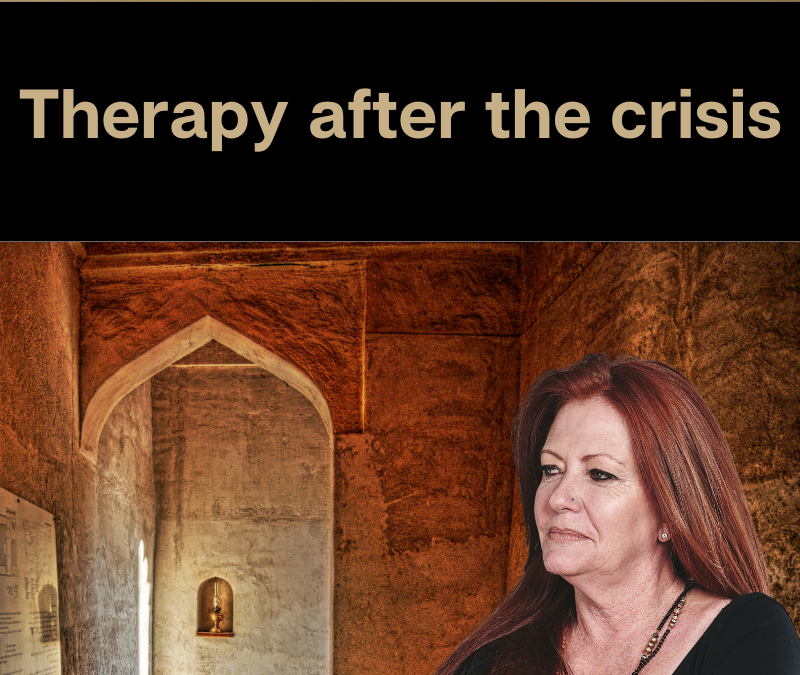
It’s no secret that the mental health industry needs an overhaul. This is not the focus on this
blog. The focus is what therapy looks like after the crisis situation has passed. Long term therapy starts when you are past the initial crisis. Depth therapy provides long term trauma healing.
So, the turmoil that correlated with the mental health crisis has passed. You have picked up the pieces and you’re functional again. Great! This is the first step to health and wellness.
Short Term Therapy
The mental health industry provides a lot of crisis intervention services with inpatient hospital
care, partial hospitalization programs (PHP), and intensive outpatient programs (IOP). To
further confound the matter, many health insurance plans provide minimal coverage for
therapy such as 3 sessions in many employee assistant programs, 6 or 12 per year, or maximum
lifetime sessions covered such as Medicare. Insurance plans do this to save money, not
because that’s all the therapy you may need. Furthermore, a lot of contemporary studies being
done focus on short-term therapy outcomes based on easy to replicate programs. These
studies focus on this because it is much easier to do short term studies that with controllable
and easy to replicate factors.
This isn’t the whole story. This is where long-term, depth-oriented therapy comes in.
Short-term, crisis-oriented modalities such as the therapy settings listed above, do help a
person navigate through a crisis and get them stabilized and back into the world so that they
are functional. The next step provides structure and coping skills to deal with mental health
symptoms, stressors, triggers, and mood fluctuations to help clients manage their symptoms
and prevent future crisis situations. However, coping skills are not the end of treatment.
Long Term Therapy. Why Depth Oriented Treatment?
Depth oriented treatment focuses on the relationship between the therapist and patient as
well as helping the client navigate through the different parts of their internal world. Depth
work may help a client resolve regrets, heal from trauma, change current relationship patterns,
and get to the underlying, internal origins of their anxiety and depression.
While the medical model manages symptoms through medication, depth therapy helps you
discover why you became depressed or anxious in the first place. Here’s a great article that compares long-term psychoanalytical treatment to short-term outcomes if you’re interested in the numbers.
True Healing Takes Time
This process is not easy. It can be stressful. Trauma work can activate similar feelings in your
day-to-day life. This is called enactment. However, the situation comes up in your life so that
you are able to realign yourself to the archetypal story that your past is a part of. Maybe that
history is victim, scapegoat, sin eater, enabler, helper, the fixer, the nurturer, the perfectionist,
the “good child,” etc. A depth therapist helps you understand how your pattern either
continues the story that is giving you grief or helps you to choose a different path that helps
you realign in a way that results in a different story outcome. The victim then takes charge of
their choices and sets some boundaries that avoid repeating the victimization.
These kinds of actions are really stressful to put into practice in your life. Fear from past
wounds comes up and may make you more anxious or make you want to avoid looking at the
situation at all. This is one reason why long term therapy can be more effectively integrated into a person’s life for permanent results.
Can therapy make me feel worse?
Yes, many of the things that happen in therapy make you more stressed out while you are
facing your complexes, grief, and trauma.
But this time, you have a therapist in the thick of it with you. You are not alone. This is
especially crucial for those who didn’t have parents they could count on for the sufficient
parenting, stability, support, and mirroring that they needed as a child.
Healing Childhood Trauma
What I’m talking about here is repairing parental childhood wounds.
How long does it take to trust someone? The amount of vulnerability and trust that is needed
between therapist and client takes time.
For some clients, rewriting their story means loneliness and lack of support from their current
friends or families. It can take even more time if they haven’t ever had people they could trust.
For some, this could take years of at least weekly therapy.
The Nature of Insurance
With this in mind, I want to touch back on the idea of insurance. Traditionally, insurance was
designed for catastrophic events such as hurricanes destroying ships at sea or house fires. The
medical model for health insurance covers catastrophic events such as surgeries and cancer
treatments. However, insurance was never really designed for maintenance and wellness
usage. Thus, insurance companies focus on pathology for limiting length of treatment and
courses of treatment to short term treatment.
By its very nature, insurance does not want to pay for long-term therapy and for wellness. They
don’t consider it profitable. During the last 25 years, therefore, insurance companies have
limited and reduced coverage for mental health therapies as well as reduced their
reimbursement rates for clinicians to the point that clinicians are not able to have sustainable
practices. Thus, it would be better to look at insurance and payment tools, such as health
savings accounts (HSA) as one piece of the puzzle and not a solution for paying for therapy.
How Depth Therapy Works
Depth therapy looks at the person holistically and individually. The person’s story, life goals,
history, desires, and individual needs are taken into consideration. These considerations are
not about pathology and disease, but about optimal functioning, finding meaning in life,
satisfying relationships, and wellness.
Furthermore, depth therapy follows the process of psyche as it unfolds. What does that mean?
It means that when I am responding to my clients, I consider the immanent needs and address
what their dreams are telling them in context to what is currently presenting in their life. What
is on their mind that week? Where is the most emotionally charged content? How psyche
unfolds in a person’s life story is not something that I can prescribe for someone. Most often,
this is a process of discovery, with disappointments and surprises along the way. This process is
a person aligning with not just their conscious ego, but with their dreamlife and toward a sense
of destiny.
Along those lines, here are some of my favorite quotes from CG Jung that revolve
around this theme
Some relevant quotes about Jungian oriented therapy:
“What did you do as a child that made the hours pass like minutes? Herein lies the key to your
earthly pursuits.”“The meeting of two personalities is like the contact of two chemical substances: if there is any
reaction, both are transformed.”“Until you make the unconscious conscious, it will direct your life and you will call it fate.”
“Your vision will become clear only when you can look into your own heart. Who looks outside,
dreams; who looks inside, awakes.”“The transcendent function is not something one does oneself; it comes rather from
experiencing the conflict of opposites.”
The therapy room can act as a secure holding space, which Jung likened to the archetype of a
circle and called it by the Latin term, temenous, or space set aside from daily life for which to
approach the transcendent, the unfolding of a life according to its inner, innate nature.
Aligning with One’s Psyche
As I continue to write, I want to stress how far, the tenor of this blog has moved away from the
medical model of pathology and toward a vision of wholeness. The transcendent function
around which much of Jungian theory is formed, is the nature of a force that is beyond the ego
control of the client and/or the therapist.
When a client is able to sit with difficult emotions, painful memories, and inevitable
contradictions, they are dealing with what Jung called above, the conflict of opposites. Often
our conscious attitudes and habits are not in alignment with our innate nature. Some of these
things can be reconciled, and some of them accepted as necessary tension without resolution.
The psyche speaks as a guide through dreams, artwork, intense emotions, fantasies, and in the
case of crises, overwhelming acute mental health events. Through long term treatment, many
individuals are able to heal from painful past experiences so that they do not need to rely on
psychiatric medicine permanently.
Third Parties in Therapy
Medication is a tool that is very useful, but is not the whole picture. Please note that I am not
saying that medication isn’t necessary for some. Medication has come a long way and is
beneficial for many. However, there are many clients for whom it becomes a crutch that they
have not needed for some time. I have also seen medication affect dreams and even a person’s
ability to access the emotional content of the unconscious because it has been “covered up” or
“smoothed over” due to the placation of medication.
From an unconscious standpoint both medication and insurance can manifest in dream work
and derivates as a third party in the therapy. It can break the temenos of the therapeutic space
as “another therapist” or warping effect on how psyche presents dream material. While I was
working in hospice, I had some patients for whom I needed to schedule my sessions at a certain
time between opioid dosage for them to have the least pain and/or the most mental acuity to
engage in their session with me. As in all things, it’s a dance to find that balance.
Why are therapists not taking insurance?
Likewise, money is an energy exchange. Investing in therapy is also about the resources you are
willing to gather up and invest in your own personal development. Do you always prioritize
yourself last? Well, the very act of paying for premium, private pay therapy may change this
relationship with yourself. Going the extra mile to make therapy financially work for you is a
shift in your priorities and your commitment to life working for you.
Let’s look at how this might contrast with therapy that you receive from a low-paying clinic
accepting the paltry payouts from Medicaid. The clinicians there are often extremely underpaid
and overworked. These clinics have high turn-over rates due to high stress environments and
lack of support for their staff. High turn-over rates turn into understaffing issues and further
lead to overbooked caseloads and schedules.
A Therapist does more than Listen
Therapists at their best are highly attuned to your unconscious stories, your patterns,
remember your history, and need to pick up on subtle changes in your expressions, your
energy, and your emotions. An overworked, underpaid, stressed out, burnt-out therapist can
do none of those things. Those therapists don’t have time or resources to review research and
go to cutting edge training programs to advance their skills. The state of insurance paid therapy
does not provide the resources needed for you to get the therapeutic services anyone needs for
long term healing and to really be able to recover in a way that thriving is possible as a long-
term outcome.
Final Thoughts
To wrap up, although much of the mental health industry relies solely on short term therapeutic techniques, in order to see long term improvement, long term solutions are necessary. Depth therapy practices go beyond crisis intervention, allowing individuals to delve into their unconscious, their history, and the origins of their psyche. Although this may seem daunting or strenuous, it is important to invest time and energy into personal wellness throughout our entire lives.
If you think depth therapy might be right for you, please reach out for a consultation.

Maggi Colwell
Maggi is a licensed art therapist at Columbus Art Therapy who assists their clients to discover more of themselves through dream analysis, art therapy, shadow work, and depth psychotherapy. They specialize in working with grief and loss as well as c-PTSD. Click the button to sign up for Maggi's newsletter to get notifications about new blogs and upcoming events including workshops, groups, rituals, and art.

